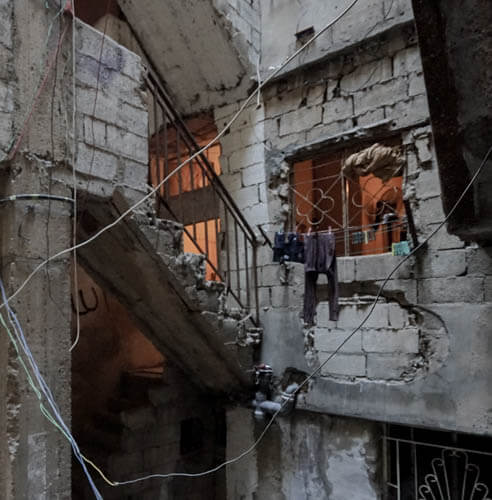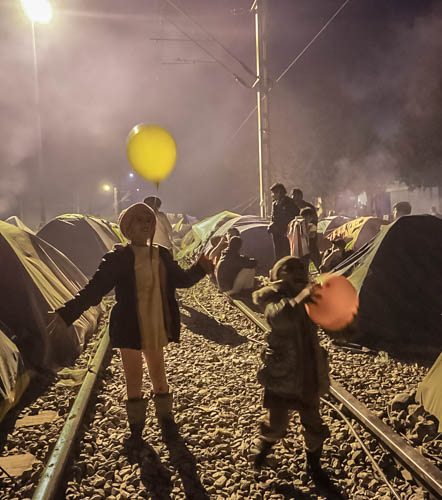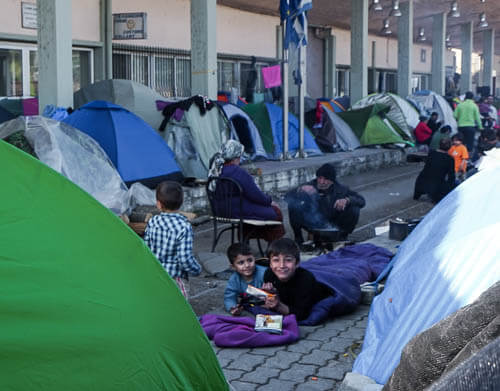In August 2015 Hala Gabriel talked to Mondoweiss about Road to Tantura, the documentary she is making about the massacre committed by Zionist forces in her ancestral village during the Nakba. Hala and her crew spent most of the month of March 2016 among refugees from Syria in Lebanon, Greece, and Germany. While their main purpose was to locate and interview Tantura exiles for the film, in the process they learned a great deal about the situation of the refugees.
Hala, the refugees from Syria are not all Syrian, are they? Many are Palestinian and were already refugees before the civil war broke out. How many Palestinians are there among the refugees?
I can’t say exactly, but there were over half a million Palestinian refugees living in Syria. At least two thirds of them have been displaced. So the number must be in the hundreds of thousands. In addition to the Syrians and Palestinians there are other refugee groups like the Kurds and the Iraqis, for instance.
You started your journey in Lebanon.
Right. We visited almost every Palestinian refugee camp in Lebanon. We tried to visit Ein El Helwa, which is one of the largest refugee camps, but the Lebanese army would not allow us to enter. The camps in Lebanon are basically ghetto shantytowns. They are enclosed and mostly guarded, very densely populated, poor, dilapidated, and crumbling. The people were all very nice, hospitable and welcoming, but frustrated and feeling hopeless.

A typical apartment in the dilapidated Shatilla refugee camp in Lebanon. Palestinian’s are prohibited from improving their dwellings in the refugee camps. (Photo: Hala Gabriel)
In Lebanon there are laws that prohibit the Palestinian refugees from working in nearly a hundred occupations. A Palestinian man is not permitted to even work as a barber legally. There are a lot of young people who are capable and eager, but extremely frustrated at the restrictions and lack of opportunity. There are also laws that prohibit Palestinians from improving or repairing their dwellings in the refugee camps. For example, if a window breaks they are not allowed to replace the glass. It has to be smuggled in.
In the Burg El-Barajneh refugee camp we learned that the camp only has running salt water. If you want to wash dishes, wash your hands, brush your teeth, or take a shower, it will have to be with salt water. There are large plastic containers throughout the camp that hold fresh water brought in by trucks. The residents have to fill small jugs and bottles from these containers to take them back to their homes for cooking, drinking, etc.
What help do the Palestinians fleeing Syria get from the United Nations?
The United Nations provides the Syrian refugees with tents but not the Palestinians fleeing Syria. The position of the UN is that since there are already refugee camps and UNRWA (an agency created by the UN General Assembly in 1949 specifically to aid the Palestinian’s displaced in 1948), the Palestinian refugees fleeing Syria should be placed in one of the existing camps. Despite the increasing population UNRWA is losing funding. It is unable to sustain the services it used to offer in the camps.
From Lebanon you went to Greece.
We visited the camp at Idomeni, a Greek village near the border with Macedonia. The situation there was surreal. Some 11,000 people were living in recreational tents. These tents were meant to be used occasionally for a few days at a time. They were not designed for long-term use. The refugees had been living in these tents for two or three months. They did their best to keep the tents clean but many had ripped. In addition to the tents, the refugees are given woolen blankets, some food and clothes for the children.

Children play with balloons on the train tracks in the Idomeni refugee camp in Greece. The air is full of smoke as the refugees do their best to stay warm. (Photo: Hala Gabriel)
The weather was cold and wet. Everything was muddy. Trash was piling up everywhere. There was no running hot water anywhere nearby. Each family or group had built a small fire to boil water and to keep warm. There were hundreds of fires and smoke filled the air. The smoke was thick because a lot of the firewood was damp and mixed with trash, clothes, plastic and whatever they could find to burn. I inhaled more smoke in the three days I stayed there then I had in my entire life. My lungs are still recovering.
Most of the people I met at Idomeni told me that they were sick and their children were sick. Everyone was exhausted after surviving the treacherous journey by land and sea from Syria via Turkey and the island of Lesbos—the Journey of Death, as they call it.
Many women told me they hadn’t washed their hair for two or more months because they had to wait in line two hours in the cold to get to the bathroom and there was no hot water in the bathrooms. A few told me they wished they had never left Syria because dying a quick death from a bomb would have been much more respectable and humane then dying a slow death in the cold. To their credit they were still good-natured and patient despite feeling so frustrated.
To cap it all, the camp was infested with rodents. They had to protect their children from rats and snakes at night.
And yet they were doing what they could to help themselves and one another. I saw women baking bread and a barber giving free haircuts. Some of the refugees collected field greens to make stew.
How did they get on with the local people?
I heard nothing but praise for the people of Greece. Even though they themselves were poor many of the local people brought food and supplies daily. They sympathized with the refugees and wanted to help them. Of course the language barrier limited communication. I was told that we were among the first visitors able to speak some Arabic.

Children reading at the Idomeni refugee camp. (Photo: Hala Gabriel)
Today I read that the Greek authorities have shut down the camp in Idomeni. Some of the refugees were detained and deported back to Turkey, others have been evacuated to guarded internment camps to “better control” the refugees. The humanitarian organization “Doctors Without Borders” says that the new camps are as bad or even worse than the camp was at Idomeni.
How did the refugees view their future?
Most wanted to take advantage of the open door that Germany offered. There are reports that Germany has now “unofficially” closed that door. Some of the refugees were heading to Sweden. Basically each person was trying to reunite with family members who had already made it to various places in Europe. Now they are not sure where they are going to end up. They distrust the government authorities and fear they will be sent back to Turkey or Syria. When I was there they kept asking me whether I knew anything. Were the borders going to be opened? What was the international plan?
However, all the Syrians I met and most of the Palestinians wanted to return to their homes in Syria when it would be safe to do so. Very few of the refugees spoke English and virtually none knew German, Greek, or any other European language.
From Greece you went to Germany. What is the situation there?
In Germany the situation is a little different. The amenities and living conditions are much better. The German government has placed many refugees in hostel or dorm-type housing. They get 300 euros a month for food and are offered classes in German.
Other refugees are still in camps. The last camp we visited in Germany, in Berlin, was called the Balloon because it was literally a big white plastic balloon tent. About 250 refugees were living in the Balloon, which was divided into cubicles on the inside for privacy. There was no ventilation, so it was very hot and stuffy even though it was pretty chilly outside. Many refugees had been stuck in the balloon for several months. The processing of refugees in Germany has been a slow because of the sheer numbers of people.
Even those refugees who have decent living conditions face frustrations of a different sort. Paperwork has to be processed before they are allowed to work. They do not speak German or understand the culture of the country, which is very different from that of the Middle East, assimilation maybe a difficult challenge.
The refugees I met were a little reserved and cautious. They are afraid that they will be sent back to Syria while the war is still going on. They don’t want to upset the Germans, but they also don’t understand what is going on around them.

Refugees at Idomeni plea to have the Macedonian border opened. (Photo: Hala Gabriel)
What was your impression of relations between refugees and local people in Germany?
Many of the Germans I met were very concerned that the country was going to move to the extreme right again. Many worry about the cost of supporting so many refugees. They are also concerned about the effect will it have on their already high taxes. I think there is a lot of tension within the German community and a lot of fear.
Have the refugees been able to hold their families together?
No, few have been able to do this. Almost every refugee I met told me that his or her family was scattered and shattered. First of all, many families could simply not afford to leave Syria together. Two members of a family might go together and leave the other three behind. Then one of those three might get the chance to go and leave the other two are left behind. The housing arrangements made by the German authorities also often make it difficult for families to reunite. One young man was hospitalized with an asthma attack when his wife and young child were not allowed to live with him in the same hostel. She was assigned to a different hotel because she had fled Syria several months after her husband.
Did any of the refugees tell you about any experiences with ISIS?
One 17-year-old Palestinian boy described how ISIS tried to recruit him and how lucky he was to escape from them. He also said that most of the ISIS members he encountered did not speak Arabic. They were foreigners and had fancy cars—models that he had never seen before.
For further reading see: Rafeef Ziadah, ‘Journeys of Dispossession: Palestinian Refugees from Syria Confronting Fortress Europe,’ darkmatter: in the ruins of imperial culture, 16 May 2016 at http://www.darkmatter101.org/site/2016/05/16/journeys-of-dispossession-palestinian-refugees-from-syria-confronting-fortress-europe/.
Source Article from http://mondoweiss.net/2016/06/struggle-refugees-interview/
Related posts:
Views: 0
 RSS Feed
RSS Feed

















 June 9th, 2016
June 9th, 2016  Awake Goy
Awake Goy  Posted in
Posted in  Tags:
Tags: 
















